 As many as 88% of people still have antibodies in their blood to fight Covid-19 six months after infection, a study of almost 1,700 people suggests.
As many as 88% of people still have antibodies in their blood to fight Covid-19 six months after infection, a study of almost 1,700 people suggests.
As many as 88% of people still have antibodies in their blood to fight Covid-19 six months after infection, a study of almost 1,700 people suggests.
The data - from one of the world's largest follow-up Covid studies - also provides more detail about the likely symptoms experienced by those infected.
While 26% had a cough and 28% had a fever, a bigger proportion - 43% - said they lost the sense of taste or smell.
But 40% had had none of these - and about 20% had had no symptoms at all.
The data also backs up previous studies on who is most likely to have been infected with Covid at some point during the pandemic.
Among a full group of nearly 20,000 people who were regularly tested monthly during the pandemic, it was younger adults, black or South Asian people and those living in deprived areas who were most likely to test positive for the antibodies.
The UK Biobank is a database of blood, urine and saliva samples, heart and brain scans and the genetic data of half a million people who volunteered to have their information analysed to help with global medical research.
Just under 20,000 of these participants each gave a blood sample every month between 27 May and 4 December 2020.
And 1,699 tested positive for antibodies during this period, which indicates a past Covid-19 infection.
Most of these were already testing positive in the first month of the study, suggesting they had acquired the infection during the first wave.
By the end of the study, six months later, 88% still had detectable antibodies.
This echoes findings from previous, smaller studies in healthcare workers.
And it is possible that some or all of the 12% whose tests went from positive to negative retained some protection against subsequent infection although their antibodies had fallen below the threshold measured by the study.
UK Biobank chief scientist Prof Naomi Allen said: "Although we cannot be certain how [the presence of antibodies] relates to immunity, the results suggest that people may be protected against subsequent infection for at least six months following natural infection.
"More prolonged follow-up will allow us to determine how long such protection is likely to last."
Not everyone was equally likely to show signs of previous infection.
The antibody study echoes other data showing which groups were hit hardest by the virus.
Among the full group of 20,000 participants, 16% of the black people tested positive for antibodies, compared with:
There were regional differences too, with Londoners most likely to have antibodies and people in Scotland least likely.
And 13.5% of the adults under 30 tested positive, compared with 6.7% of the over-70s.
A separate study by the ONS, based on blood test results from a random sample of people over 16, found around one in seven people in England had antibodies in their blood in mid-January.
The figure was one in nine in Wales, one in 11 in Northern Ireland and one in 10 in Scotland.
This suggests these people had been infected with the virus in the past, but this is unlikely to be the total infected since the start of the UK epidemic last spring because antibodies - although they are present for at least six months after infection - do decline over time.
Vaccinations also build up antibodies in those given jabs, to help fight off the virus, but the ONS does not differentiate between the two things.
By Rachel Schraer
Health Reporter- BBC